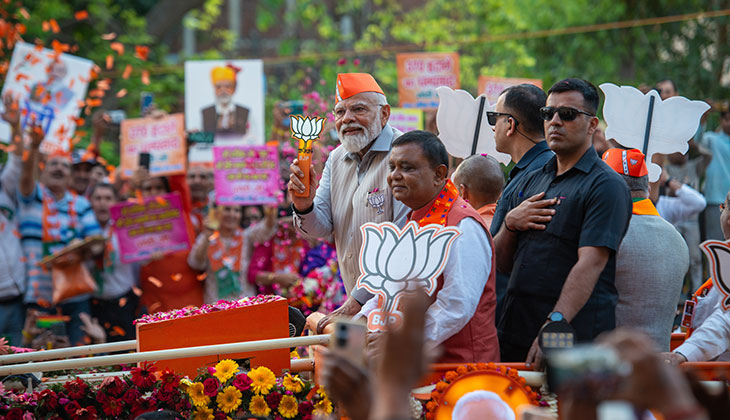As Delhi heads into its Legislative Assembly elections on February 5, 2025, an unmistakable air of tension clings to the citizens. Elections, as part of the very fabric of democracy, not only usher in a change of governments but also significant emotional and psychological distress for individuals invested in the outcome. This phenomenon, often termed "election anxiety," is nothing new but has gained much ground in recent years due to social media amplification, political polarization, and economic concerns.
The 2025 Delhi elections have become a central point in political discourse with major parties including the Aam Aadmi Party (AAP), Bharatiya Janata Party (BJP), and Indian National Congress (INC). The electoral battle is hot, as its outcome will frame governance in the capital for the next five years. Amid the campaigning, debates, and speculation, a majority of the population is experiencing more stress than normal.
Everyone feels election anxiety differently. Some become emotionally rattled, others passionately argue, while numerous persons become confused about the future. This article will delve into the causes, symptoms, and ways of dealing with election anxiety in the context of present Delhi elections.
Understanding Election Anxiety
What is Election Anxiety?
Election anxiety refers to the emotional reaction to electoral uncertainty and stakes. Although normal to be anxious about the governance future, more than usual stress may cause severe negative emotional and physical impacts. This is so because of fears of the unknown, political rhetoric influence, and uncertainty of outcomes.
Causes of Election Anxiety
Several factors contribute to increased election-related stress:
1. Uncertainty and Unpredictability
Elections are inherently uncertain, and no outcome is guaranteed. This unpredictability creates stress, especially when voters fear an unfavorable result. For example, a supporter of a ruling party may worry about whether their preferred policies will continue, while an opposition supporter may fear that change will not materialize.
2. High Stakes in Political Decisions
All features of life count politically, especially when it comes to employment, education, health care, and civil rights. The perception that an election would make a substantial difference in future life creates much anxiety. People fear inflation, taxation, safety, and public welfare programs, all of which depend on the results of elections.
3. Media Overload and Sensationalism
The 24/7 news cycle and the steady stream of political content on social media outlets create an overload of information. News updates, opinion polls, and expert analyses have created an environment where people are compelled to keep up with everything, leading to mental fatigue. Sensationalist headlines, debates, and fear-mongering add to anxiety.
4. Political Polarization and Social Conflict
This has resulted in stressful interactions within the family, workplaces, and communities, as people increase the tension between political ideologies. People with opposing political views often engage in heated arguments that can damage relationships and create emotional distress.
5. Personal Investment in Election Outcomes
Many individuals tie their personal hopes and aspirations to a particular party or leader. The fear of defeat can create a sense of personal loss. When people strongly identify with a political ideology, an unfavorable result may feel like a direct attack on their values and beliefs.
6. Misinformation and Fear Mongering
The widespread dissemination of false information and exaggerated stories amplifies fear, making it hard to separate real facts from propaganda. Political parties and media channels in some instances use potential negative impacts a non-supporting party will entail in the event of winning as fuel to whip up anxiety.
Symptoms of Election Anxiety
Election anxiety may have different symptoms, such as:
- Psychological Symptoms: Fear, aggression, hostility, depression, bitterness, and perceived powerlessness.
- Somatic Symptoms: Headaches, muscle strain, sleep disturbance, fatigue, stomach upset
- Cognitive Symptoms: Reduced ability to think clearly, ruminations by checking updates continually, catastrophic thoughts (anticipation of worst possibilities).
- Behavioral Symptoms: Aversions to discuss the political scenario with others, outbursts when discussing it with others, becoming overly involved on social media with the situation or avoiding others
Election Anxiety in Delhi’s 2025 Elections
Delhi, being the political heart of India, experiences heightened election-related stress compared to other regions. The 2025 elections have further amplified this due to multiple factors:
1. A Highly Competitive Electoral Landscape
Opinion polls indicate a closely contested fight between AAP, BJP, and INC. AAP, under the leadership of Arvind Kejriwal, wants to continue its rule, while BJP is looking to make substantial gains. INC, though it has been the traditional winner in Delhi, is trying to regain its lost glory. The suspense over the outcome is creating restlessness among the supporters of all parties.
2. Issues Involved
Some critical issues which dominate the 2025 Delhi elections therefore make the concerned citizen anxious, namely:
- Pollution and Environmental Policies: For decades, Delhi has had a critical air pollution crisis. The citizens are concerned to know if the new policies will bring an end to these deadly phenomena.
- Infrastructure and Public Transport: Debates over metro expansion, road safety, and urban planning have become more intense.
- Education and Healthcare: AAP's flagship reforms in education and healthcare face opposition parties which present alternative models. Law and Order are becoming the center of the controversy as crime rates and security are issues of increasing concern. Water and Electricity supply promises of free utilities versus sustainable governance is the one on which people will be discussing and debating this election.
3. Battles of Social Media
Twitter, WhatsApp, and Facebook have become battlegrounds for political discourse, which leads to heated arguments and misinformation. Most people feel they must participate in political debates, which heightens stress. Biased information, manipulated videos, and fake news contribute to election anxiety.
4. Fear of Policy Reversals
Supporters of the ruling party fear that a change in government could undo existing policies, while opposition supporters worry about the continuation of policies they oppose. This uncertainty contributes to widespread anxiety.
Coping Strategies for Election Anxiety
While elections are unavoidable, managing one’s mental well-being during this period is crucial. Here are some strategies to cope with election anxiety:
1. Reduce Media Exposure
Too much news can actually worsen the stress. One can limit exposure to social media and only listen to credible news sources for updates.
2. Get Active
Regular exercise, yoga, and outdoor activities decrease stress hormones and enhance mood. Physical activity can help one shake off the feeling of being under tension.
3. Be Mindful and Relax
Meditation, deep-breathing exercises, and journaling can give a sense of emotional balance and perspective. Gratitude practices can also be used to divert your attention away from stress.
4. Focus on What You Can Control
Do not worry about how things are going to happen but instead invest time in doing constructive action, such as voting, awareness campaigns, and civic action. Controlling the action rather than the fear is how control will return.
5. Maintain Social Connections
Relief from election madness is found in non-political conversations with friends and family. Social balance is maintained, thus reducing stress and anxiety.
6. Seek Professional Help if Needed
If election anxiety is interfering with daily life, consulting a mental health professional can be helpful. Therapy and counseling are effective tools to manage stress.
The Role of Political Parties and Media in Reducing Election Anxiety
While individual coping strategies are important, systemic changes can help reduce election-related stress:
1. Responsible Political Campaigning
Political parties should focus on issue-based debates rather than fear mongering and personal attacks.
2. Balanced Media Reporting
News outlets should present unbiased information and avoid sensationalism to prevent panic and misinformation.
3. Encouraging Civil Political Discourse
Promoting respectful dialogue instead of aggressive debates can reduce polarization and stress.
Conclusion
Election anxiety is a real and growing concern, particularly in politically active regions like Delhi. The high stakes, media influence, and societal divisions contribute to widespread stress among the general public. However, by adopting healthy coping mechanisms and promoting responsible political engagement, individuals can navigate the electoral season with greater resilience.
As Delhi is set to vote, it is worth reminding that democracy makes effective use of not only elections but also collective mental well-being.
How Solh Wellness Can Help:
At Solh Wellness, we provide holistic, compassionate support to individuals who are experiencing emotional turmoil. Through our tech-driven platform, we offer anonymous counseling, support groups, and mental health resources to individuals experiencing distress, particularly those facing abusive family dynamics or relational struggles. We offer evidence-based interventions that help individuals navigate emotional crises while fostering resilience and hope. By creating awareness about mental health and making help-seeking behavior the norm, Solh Wellness seeks to break the cycle of isolation and provide the support needed to prevent further tragedy.
R.E.A.C.H. the pinnacle of your mental health and BUILD;
Resilience: Solh's personalized plans help users build emotional strength and coping strategies, fostering long-term resilience and emotional well-being.
Evaluate: Streffie stress tracking helps users evaluate their stress at three levels—actual, perceived, and measured—empowering proactive management before a crisis emerges.
Act: Crisis management tools are immediately accessible, and the user can reach out to mental health professionals using Talk Now.
Connect: Support groups make users feel like they belong. They can relate to others going through similar problems, which makes them less isolated and helps them find healthier ways of coping.
Heal: Anonymous counseling and educational resources guide users to recognize their emotions, work through difficult situations such as abusive relationships, and start healing in a safe environment.
Together, we can address the roots of suffering, providing a much-needed mental rest and clarity. Reach out to Solh Wellness today for professional help if you, or someone you know, needs it.








